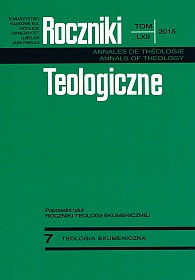Saint Thomas in the Thought of Jacob Arminius
Abstract
The aim of this article is to expose the elements of the theology of Jacob Arminius, which has their foundation in the thought of saint Thomas. Arminius due to his fondness to the Aquinas, was distinguished among the reformed theologians of post-reformation era. The Thomistic character of his doctrines of God, creation and God’s providence partly separated him from the stream of Calvinist theological tradition, in which he was educated.
The Dutch reformer starts his discourse about God, in the pattern of the Angelic Doctor, from the analogical cognition of Creator. Based on this presupposition and metaphysics of Thomas, the leiden’s professor accepted the traditional, scholastic understanding of God as a simple entity, who’s essence and existing are identical. Arminius was also intellectualist by subordinating the will of God to his reason. Natura Dei is perforce good and just, therefore the act of creation is the granting of kindness. God’s providence, that sustains everything in existence, cannot operate against the purposes contained in the bringing of the world to entity. It must be always oriented on what is consistent with the scientia et sapientia Dei. The Dutch reformer just like the Aquinas was not a occasionalist. He was leaving the rightful space for the second causes (causae secundae). The presentation of views of Arminius, on the background of Thomas, leads to a conclusion that he depended on the great master of scholasticism in the main points of his theology.
References
Arminius J.: Opera theologica. Leiden: Godefridus Basson 1629.
Arystoteles: Etyka nikomachejska. Tłumaczenie, wstęp i komentarz D. Gromska. Warszawa: PWN 2007.
Beckwith F.: Doting Thomists. Evangelicals, Thomas Aquinas, and Justification. „Evangelical Quarterly” 85:2013 s. 211-227.
Boer den W.: God’s Twofold Love. The Theology of Jacob Arminius (1559-1609). (seria: Reformed Historical Theology. Vol. 14). Tłum. A. Gootjes. Göttingen: Vandenhoeck & Ruprecht 2010.
Geisler N.L., McKenzie R.: Roman Catholics and Evangelicals. Agreements and Differences. Grand Rapids: Baker Academic 1995.
Geisler N.L.: Systematic Theology. T. 3: Sin, Salvation. Grand Rapids: Baker Academic 2004.
Gerstner J.: Aquinas was a Protestant. „Tabletalk” 1994 nr 5 s. 13-15.
Muller R.A.: Dictionary of Latin and Greek Theological Terms. Drawn Principally from Protestant Scholastic Theology. Grand Rapids: Baker Academic 1985.
Muller R.A.: Arminius and Scholastic Tradition. „Calvin Theological Journal” 24:1989 s. 263-277.
Olson R.E.: Arminian Theology. Myths and Realities. Downers Grove: InterVarsity Press 2006.
Reuter K.: Das Grundverständnis der Theologie Calvins. Neukirchen: Neukirchener Verlag des Erziehungsvereins 1963.
Reymond R.L.: Dr. John H. Gerstner on Thomas Aquinas as a Protestant. „Westminster Theological Journal” 59:1997 s. 113-121.
Sproul R.C.: Faith Alone. The Evangelical Doctrine of Justification. Grand Rapids: Baker Academic 1995.
Stanglin K.D.: The Missing Public Disputations of Jacobus Arminius. Introduction, Text, and Notes. Leiden-Boston: Brill 2010.
Stanglin K.D., McCall T.H.: Jacob Arminius. Theologian of Grace. New York: Oxford University Press 2012.
Tomasz z Akwinu: Suma Teologiczna. Tłum. pol. źródło: http://www.katedra.uksw.edu.pl/suma/suma_indeks.htm (dostęp: 11.11.2014).
Torrance T.F.: Knowledge of God and Speech about him according to John Calvin. W: Theology in Reconstruction. London: William B. Eerdmans Publishing 1965.
Witt W.G.: Creation, Redemption and Grace in the Theology of Jacob Arminius [dysertacja doktorska]. University of Notre Dame 1993.
Copyright (c) 2015 Roczniki Teologiczne

This work is licensed under a Creative Commons Attribution-NonCommercial-NoDerivatives 4.0 International License.





